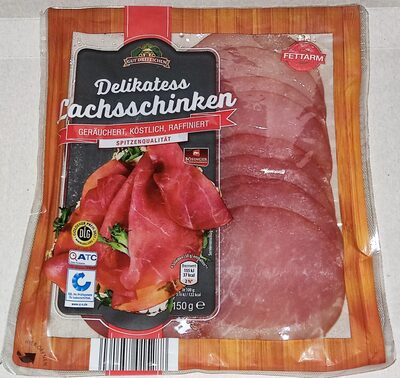
Barcode: 4061458015288
Lachsschinken geräuchert
HARAM
📝 Reason: The product contains Schweinefleisch (pork), which is explicitly prohibited in Islam (Quran 5:3). Therefore, the entire product is classified as Haram. Other ingredients are generally Halal, but the presence of pork overrides all other considerations.
📄 Certificates: None
Ingredients:
Details
Understanding the Halal Status of Lachsschinken geräuchert
Lachsschinken geräuchert, commonly known for its rich smokey flavor, is a delicacy made from pork. However, its halal status raises many questions among consumers, especially those adhering to Islamic dietary laws. In this post, we will explore the reasons why this product is classified as Haram and examine its ingredients in detail.
Halal vs Haram: What You Need to Know
In Islam, the consumption of pork is explicitly prohibited according to the Quran. The Quran states in 5:3, “Forbidden to you are dead animals, blood, the flesh of swine, and that over which has been invoked the name of other than Allah.” This makes the primary ingredient—Schweinefleisch (pork)—of Lachsschinken geräuchert Haram, regardless of the nature of other ingredients present.
Ingredients Breakdown
While it’s essential to focus on the primary ingredient, it is also critical to analyze the remaining elements of the product, which include:
- Schweinefleisch (Pork): Explicitly prohibited in Islam.
- Speisesalz (Table Salt): Generally considered Halal. Salt is universally accepted in various cuisines.
- Gewürze (Spices – Garlic, Coriander, Clove, Pepper, Juniper, Cinnamon): As a rule, spices are typically Halal unless they are contaminated with Haram substances.
- Dextrose: A sugar that is Halal, derived from starch.
- Natriumascorbat (Sodium Ascorbate, E301): A Halal antioxidant commonly used in food preservation.
- Zucker (Sugar): Generally acceptable as Halal.
- Natriumcitrate (Sodium Citrate, E331): Recognized as a Halal food stabilizer.
- Natriumacetate (Sodium Acetate, E262): Used as a Halal acidity regulator in foods.
- Citronensäure (Citric Acid, E330): This acidity regulator is also Halal.
- Gewürzextrakte (Spice Extracts): Similar to spices, these are Halal unless tainted by prohibited substances.
- Natriumnitrit (Sodium Nitrite, E250): A Halal preservative used in curing meats.
- Buchenholzrauch (Beechwood Smoke): Generally considered Halal.
The Impact of Pork on Halal Certification
Despite the presence of several Halal ingredients, the existence of pork as the dominating component entails that Lachsschinken geräuchert cannot be classified as halal. The Halal status is significantly influenced by individual components of the product. Hence, the overall classification remains Haram regardless of other ingredients.
Conclusion: What Does This Mean for Consumers?
For those observing halal dietary laws, it is crucial to avoid products like Lachsschinken geräuchert due to its pork content. Understanding the halal status of food items is essential to maintaining compliance with religious teachings and personal values. Moreover, the presence of Halal substances does not redeem the product’s overall Haram classification as long as pork remains its primary ingredient. Always check labels and ingredient lists if you are unsure of a product’s eligibility. If pork is present, it is wise to avoid it entirely.
In conclusion, while Lachsschinken geräuchert offers delightful flavors, it is not a suitable option for halal consumers. Stay informed and make conscious choices regarding your food for a compliant lifestyle.
